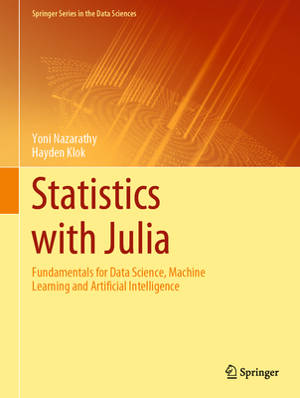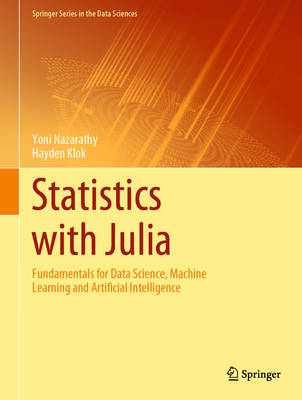
- Retrait gratuit dans votre magasin Club
- 7.000.000 titres dans notre catalogue
- Payer en toute sécurité
- Toujours un magasin près de chez vous
- Retrait gratuit dans votre magasin Club
- 7.000.0000 titres dans notre catalogue
- Payer en toute sécurité
- Toujours un magasin près de chez vous
Statistics with Julia
Fundamentals for Data Science, Machine Learning and Artificial Intelligence
Yoni Nazarathy, Hayden Klok
189,95 €
+ 379 points
Format
Description
This monograph uses the Julia language to guide the reader through an exploration of the fundamental concepts of probability and statistics, all with a view of mastering machine learning, data science, and artificial intelligence. The text does not require any prior statistical knowledge and only assumes a basic understanding of programming and mathematical notation. It is accessible to practitioners and researchers in data science, machine learning, bio-statistics, finance, or engineering who may wish to solidify their knowledge of probability and statistics.
The book progresses through ten independent chapters starting with an introduction of Julia, and moving through basic probability, distributions, statistical inference, regression analysis, machine learning methods, and the use of Monte Carlo simulation for dynamic stochastic models. Ultimately this text introduces the Julia programming language as a computational tool, uniquely addressing end-users rather than developers. It makes heavy use of over 200 code examples to illustrate dozens of key statistical concepts. The Julia code, written in a simple format with parameters that can be easily modified, is also available for download from the book's associated GitHub repository online.
See what co-creators of the Julia language are saying about the book:
Professor Alan Edelman, MIT: With "Statistics with Julia", Yoni and Hayden have written an easy to read, well organized, modern introduction to statistics. The code may be looked at, and understood on the static pages of a book, or even better, when running live on a computer. Everything you need is here in one nicely written self-contained reference.
Dr. Viral Shah, CEO of Julia Computing: Yoni and Hayden provide a modern way to learn statistics with the Julia programming language.This book has been perfected through iteration over several semesters in the classroom. It prepares the reader with two complementary skills - statistical reasoning with hands on experience and working with large datasets through training in Julia.
The book progresses through ten independent chapters starting with an introduction of Julia, and moving through basic probability, distributions, statistical inference, regression analysis, machine learning methods, and the use of Monte Carlo simulation for dynamic stochastic models. Ultimately this text introduces the Julia programming language as a computational tool, uniquely addressing end-users rather than developers. It makes heavy use of over 200 code examples to illustrate dozens of key statistical concepts. The Julia code, written in a simple format with parameters that can be easily modified, is also available for download from the book's associated GitHub repository online.
See what co-creators of the Julia language are saying about the book:
Professor Alan Edelman, MIT: With "Statistics with Julia", Yoni and Hayden have written an easy to read, well organized, modern introduction to statistics. The code may be looked at, and understood on the static pages of a book, or even better, when running live on a computer. Everything you need is here in one nicely written self-contained reference.
Dr. Viral Shah, CEO of Julia Computing: Yoni and Hayden provide a modern way to learn statistics with the Julia programming language.This book has been perfected through iteration over several semesters in the classroom. It prepares the reader with two complementary skills - statistical reasoning with hands on experience and working with large datasets through training in Julia.
Spécifications
Parties prenantes
- Auteur(s) :
- Editeur:
Contenu
- Nombre de pages :
- 527
- Langue:
- Anglais
- Collection :
Caractéristiques
- EAN:
- 9783030709006
- Date de parution :
- 04-09-21
- Format:
- Livre relié
- Format numérique:
- Genaaid
- Dimensions :
- 218 mm x 290 mm
- Poids :
- 1451 g

Les avis
Nous publions uniquement les avis qui respectent les conditions requises. Consultez nos conditions pour les avis.






